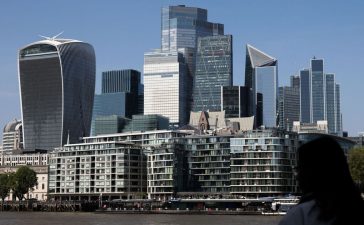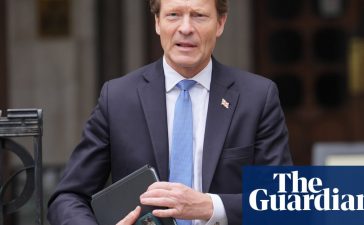Jeremy Hunt says economy is more resilient than feared
Chancellor Jeremy Hunt says has warned that the UK economy is not out of the woods, after narrowly swerving a recession in the last quarter.
Hunt says the economy is showing more resilience than expected, pointing out that the UK’s 4% growth during 2022 is faster than other advaned economies.
He says:
“The fact the UK was the fastest growing economy in the G7 last year, as well as avoiding a recession, shows our economy is more resilient than many feared.
“However, we are not out the woods yet, particularly when it comes to inflation.”

Key events
Filters BETA
Activity in the UK’s legal profession picked up in December, by 3.1%, today’s GDP data shows.
Although that helped keep the country out of a technical recession, it may be a worrying sign – if it’s due to legal disputes over debts, or insolvencies (which jumped last year)
Steven Mather, director and lawyer at Leicester-based Steven Mather Solicitor, predicts a rise in insolvencies in 2023.
“Lawyers were busy during the fourth quarter as the storm clouds gathered. We’ve seen a significant uptick in business clients needing debt recovery, which doesn’t bode well for the economy.
In good times, a business can often overlook a £20k debt or even a £100k debt, but when the economy gets tighter, they start looking at their aged debtors and push harder for payments. Getting on top of aged debt can really help your cash flow but, as the chain upwards may be struggling with cash flow, too, it’s not necessarily easy to get paid.
Sadly it’s sometimes the one who shouts loudest who gets paid first. I’m fully expecting insolvencies to increase hugely this year. The issue with insolvency is that there’s often a whole chain of small businesses below as suppliers who are hung out to dry with no likelihood of getting paid which puts pressure on them to pay staff and keep the economy going.”
Tahina Akther, barrister and co-founder at London-based Wildcat Law, has seen a rise in businesses looking to exit contracts, or considering filing claims for damages under contract clauses.
“Financial legal disputes, which kept lawyers busy in December, are usually a forerunner of a full recession and we saw a spike in enquiries coming through during the final quarter of last year.
The news that Britain narrowly dodged falling into recession at the end of last year hasn’t brought much cheer to the City of London.
The pound is little changed, around $1.211 against the US dollar. It fell to a one-month low below $1.20 earlier this week.
The UK’s blue-chip share index, the FTSE 100, has hit several record highs this week. Today, though, it’s down 0.15% at 7898 points.
Banking group Standard Chartered are the top FTSE 100 faller, down 4.6%, after the UAE’s largest bank, First Abu Dhabi Bank, insisted it is not evaluating a takeover offer (reports yesterday of a possible bid drove Standard Chartered up).
The Resolution Foundation agrees that the UK economy is not yet “out of the woods”, after flatlining in the last quarter.
James Smith, research director at the Resolution Foundation, points out that families are still living through a living standards downturn.
“The longer-term picture is more worrying, with the UK economy yet to return to its pre-pandemic size having suffered a prolonged period of weak growth since the financial crisis.
“However, falling wholesale gas prices offer hope for households and the wider economy – with inflation on track to fall sharply later this year.”
Video: Hunt says UK economy has underlying resilience
Here’s a video clip of chancellor Jeremy Hunt responding to today’s GDP figures.
As flagged earlier, he welcomes the news that the UK has avoided a technical recession and was the fastest growing G7 economy last year (at 4%, compared to 2.1% for the US and Germany’s 1.9% growth).
Inflation is still much too high, Hunt warns, and causing pain to families across the country. That’s why the government must stick to its plan to half inflation this year, he says.
[that plan includes not paying inflation-beating pay rises to public sector workers].
Controlling the cost of living is the Bank of England’s job, of course – and the BoE has already forecast that inflation will fall sharply this year.
Hunt adds that the UK can be “one of the most prosperous countries in Europe”, if it plays to its strength in science and technology.
Yesterday, though, the boss of pharmaceuticals giant AstraZeneca said the UK’s “discouraging” tax regime had deterred it from building its new $360m ‘state-of-the-art’ manufacturing plant in Britain. It went to Ireland instead.
Dodging recession is welcome news, but it doesn’t mean the UK economy is in great shape, of course.
Alfie Sterling, chief economist at the New Economics Foundation, shows here how UK GDP is still below its pre-pandemic levels, after three troubled years:
The 0.5% drop in UK GDP in December was partly caused by the widespread industrial action across the country at the end of 2022, says Martin Beck, chief economic advisor to the EY ITEM Club.
Beck explains:
Widespread industrial action probably explains a large part of December’s fall in activity. There is likely to have been a substantial direct impact on some sectors. For example, shutdowns across the rail network will have weighed heavily on output in the transport sector.
There’s also likely to have been an indirect impact from the transport disruption, both in terms of stopping people getting to work and compromising their ability to engage in leisure activities.
EY ITEM Club, a forecasting group, thinks GDP may dip further in the first half of 2023.
The cost of living squeeze, higher interest rates, and tax increases will all hit growth, as Beck says:
The ongoing squeeze on household spending power from high inflation will weigh on consumer spending, while the combination of pressure on profitability and the uncertain outlook makes for a challenging backdrop for business investment.
In addition, policy settings will be tight, with a significantly tightening of fiscal policy due to be implemented from April and much of the impact of higher interest rates still to feed through.
Deloitte: we expect GDP contraction this year
Today’s GDP report is only the first estimate of what happened in the economy in the last quarter of 2022.
So there’s a risk that the report is revised in coming months, as more data comes in from across the economy, says Debapratim De, senior economist at Deloitte:
“The UK avoided a recession last year but by the slimmest of margins. Going by recent data revisions, today’s figures could well be revised downwards in a few months, painting a very different picture for growth.
“Recession or not, UK growth has stagnated for some time now. Despite the marginal improvement in sentiment over the last few weeks, we continue to forecast a contraction in GDP this year.”
The UK has dodged the technical definition of a recession by “a hair’s breadth”, says Laura Suter, head of personal finance at AJ Bell:
“The government will pounce on these figures as an example of why the IMF and other economists’ predictions of UK economic doom are too downbeat, no doubt latching onto the fact that we’re not in a technical recession. And, perhaps more worryingly for the UK public, the Bank of England may well see this as a sign that they can go higher and harder with rate rises at their next meeting.
“Why does a recession matter to the UK public? Recessions brings slower growth from many companies, meaning fewer pay rises and the potential for job losses as businesses struggle.
While the jobs market is still pretty tight, many of those effects could still be felt despite dodging a technical recession.”
Reeves: Britain’s economy is stuck in the slow lane
Britain’s economy is stuck in the slow lane and working people are paying the price, says Labour’s shadow chancellor, Rachel Reeves.
She explains:
“Today’s figures show us how – despite Britain’s great potential – our economy is stuck in the slow lane,” she said.
“We can be a leader in the industries of the future that will help grow our economy.”
“And we must bring in urgent measures to prevent yet more harm from the cost-of-living crisis, using a proper windfall tax on oil and gas giants to stop the energy price cap going up in April so that people have more money in their pockets.”
GDP figures show growth at 0.0%.
Despite Britain’s great potential, our economy is stuck in the slow lane and working people are paying the price.
The government must get a grip of the cost of living crisis and urgently bring forward a proper plan for growth.
— Rachel Reeves (@RachelReevesMP) February 10, 2023
RSM: UK still faces recession in 2023
The worst is yet to come for the UK economy, with consumer spending is likely to falter this year as the squeeze on household real incomes intensifies, one economist warns.
Thomas Pugh, economist at audit, tax and consulting firm RSM UK, predicts that UK GDP will contract in the first half of this year – meaning a recession this year.
And while it may be milder than the Bank of England feared a few months ago, that would encourage the central bank to raise interest rates again soon to 4.25%, he predicts.
Pugh says:
‘The UK has avoided falling into recession by the skin of its teeth, but the worst is yet to come. There are clear signs that the economy has deteriorated over the last few months, GDP fell by 0.5% in December after growing by 0.1% in November.
The combination of double-digit inflation, the huge rises in interest rates over the last year and less fiscal support means households real disposable incomes are set to shrink sharply in the first half of this year. That will lead to falling consumer spending and a shrinking economy. As a result, we think the recession has just been delayed rather than cancelled.
‘Of course, narrowly avoiding a recession doesn’t change much on the ground. For businesses operating in the real economy a rise in GDP of 0.1% doesn’t feel much different to a drop in GDP of 0.1%. But a milder recession would mean that unemployment rises more slowly, wage growth stays strong and domestically generated inflation falls at a slower pace than expected.
This could result in the Bank of England (BoE) raising rates by more than expected.
Despite the typical seasonal boost to spending around the Christmas period, December suffered a sharp economic sharp contraction which meant that the UK economy logged zero growth during the final quarter of 2022, says Victoria Scholar, head of investment at Interactive Investor.
December’s growth was negatively impacted by industrial action across the UK with postal strikes, a hit to public services and lower school attendance. On top of that the Premier League football’s pause for the FIFA World Cup also had a negative impact on UK GDP. Lingering double-digit inflation also continues to weigh on consumer confidence, spending and business margins.
The Bank of England has recently rolled back its highly pessimistic forecasts from last year for the UK economy to face the longest recession since records began. Instead in the final quarter of 2022, it was projecting growth of 0.1%, which the official data just fell short of this morning.
Although the UK managed to technically stave off a recession, the growth picture remains bleak weighed down by industrial action and sky-high inflation which is driving the cost-of-living crisis for consumers and a cost of doing business crisis too. The UK central bank is in the unenviable position of trying to raise interest rates to the extent that price pressures cool without inadvertently tipping the economy into a recession.
Today’s GDP report includes some “worrying developments”, warns David Bharier, head of research at the British Chambers of Commerce.
Bharier points out that output in the production sector shrank in the last quarter.
He says companies were hit by high energy prices, and also face headwinds including continuing strike action and further uncertainty around Britain’s trading relationship with Europe.
Production output fell by 0.2% in Q4 2022, eight of the 14 service sectors saw contractions, and monthly GDP fell by 0.5% in December.
“Small businesses have seen three years of economic shocks, including lockdowns, global supply chain crises, Brexit, and soaring energy costs.
“Our research has shown that most small firms have seen no improvements to sales, exports, or investment. Retailers and hospitality firms are among the worst affected as consumer confidence takes a hit.
ONS: anecdotal evidence that strikes hit economy
There is “anecdotal evidence” to suggest that industrial action had an impact across a wide range of industries in December, the Office for National Statistics says.
In its December GDP report, the ONS says there is anecdotal evidence to suggest that rail strikes had negatively impacted some businesses.
Most comments were received from restaurants, caterers, hotels and bars, but other affected units included those engaged in the manufacture of jewellery, the wholesale of food, beauty treatments and the wholesale of wine. Units involved in car hire and in land transport reported an increase in turnover because of the rail strikes.
There was also anecdotal evidence that postal strikes had negatively impacted some businesses, the statistics body explains:
The units affected included businesses engaged in financial planning, hospitality, computer repair, and management consulting.
Other units affected include those involved in the manufacture of metal doors and windows, blankets and jewellery and the wholesale of flowers, watches, garden furniture, computer equipment, optical equipment, motor vehicle parts, and households’ goods.
UK escapes recession “by the skin of its teeth”
The UK has escaped recession by the skin of its teeth, says Jeremy Batstone-Carr, European Strategist at Raymond James Investment Services.
Batstone-Carr points out that the cost of living crisis will continue to hit households this year:
Today’s figures confirm that the UK has escaped recession by the skin of its teeth in 2022. With December’s contraction of 0.5%, skirting recession by the slimmest of margins, the UK has achieved a minor economic victory.
November’s 0.1% growth came as a significant surprise, with England’s footballers providing sufficient cheer to temporarily offset the negative effects of elevated inflation and rising rates. But the footballers have now packed up and come back home, bringing an end to this economic reprieve.
We are still in for the downturn which so far has been barely kept at bay. It will be shorter and shallower than previously thought, as per the Bank of England’s forecasts. The lagged impact of earlier base rate increases combined with additional policy tightening will ensure it happens.
However, whether we are officially in recession will not make much difference to most people – it will simply feel like a continuation of the present sluggishness and cost-of-living woes.
Full story: UK narrowly avoids recession after figures show growth flatlining

Phillip Inman
The UK narrowly avoided entering a recession at the end of last year, official figures reveal, after economic growth was flat in the final three months of 2022, my colleague Phillip Inman reports.
However, the economy did contract in December, as feared – by 0.5% – following a growth figure of 0.1% in November and 0.55% in October.
Negative growth in the fourth quarter would have signalled recession, after the economy shrank by 0.3% in the third quarter, according to the figures from the Office for National Statistics. A technical recession is generally defined as two consecutive quarters of negative growth.
With the cost of living crisis eating into household spending power and many small businesses struggling to stay afloat, few economists expected a strong performance in the run-up to the festive season.
Jeremy Hunt says economy is more resilient than feared
Chancellor Jeremy Hunt says has warned that the UK economy is not out of the woods, after narrowly swerving a recession in the last quarter.
Hunt says the economy is showing more resilience than expected, pointing out that the UK’s 4% growth during 2022 is faster than other advaned economies.
He says:
“The fact the UK was the fastest growing economy in the G7 last year, as well as avoiding a recession, shows our economy is more resilient than many feared.
“However, we are not out the woods yet, particularly when it comes to inflation.”








